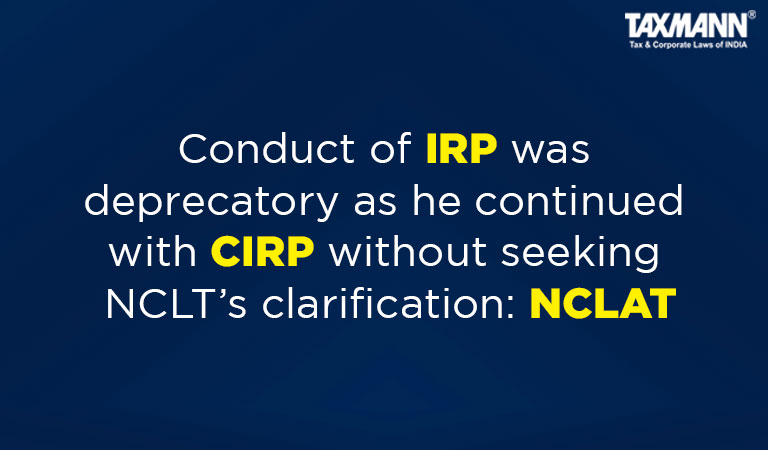Conduct of IRP was deprecatory as he continued with CIRP without seeking NCLT’s clarification: NCLAT
- Blog|News|Insolvency and Bankruptcy Code|
- 2 Min Read
- By Taxmann
- |
- Last Updated on 10 November, 2022

Case Details: Alok Kaushik Erstwhile Resolution Professional of Cheema Spintex Ltd. v. Cheema Spintex - [2022] 144 taxmann.com 71 (NCLAT-New Delhi)
Judiciary and Counsel Details
-
- Justice Ashok Bhushan, Chairperson & Barun Mitra, Technical Member
- Rajendra Beniwal & Aman Singhania, Advs. for the Appellant.
- Kshitij Kumar, Adv. for the Respondent.
Facts of the Case
In the instant case, an operational creditor filed a petition under section 9 to initiate CIRP against the corporate debtor. The NCLT audited said application and commenced CIRP proceedings, the appellant-IRP was appointed, and in pursuance of duties and responsibilities, a public announcement was made. However, before the expiry of last date for submission of claims, a settlement arrived between R1 and the operational creditor, and latter submitted forms FA to the IRP seeking withdrawal from the CIRP.
Later, the IRP moved an application before NCLT for withdrawal of the CIRP application under section 12A, including discharge from duties as IRP and restoration of the suspended board of directors of the corporate debtor. The NCLT while considering the stay application of the corporate debtor had directed the IRP to file the details of its fee charged for conducting the business of the corporate debtor.
The NCLT vide impugned order, held that CIRP process be closed and that the withdrawal application having been filed prior to constitution of the CoC, there was no requirement to obtain the consent of the members of the CoC in this regard. The NCLT further held that the IRP committed misconduct in not pursuing the withdrawal application filed by himself only and unnecessarily adding to the costs by carrying out non-essential activities.
On appeal, the appellant submitted that mere filing of the withdrawal application did not lead to automatic stay of the CIRP proceedings, therefore, as IRP he was duty bound under the CIRP regulation to complete the CIRP proceedings, and for this purpose he had to engage other professionals and deploy resources, thereby incurring expenses.
The appellant further submitted that the CIRP costs and IRP’s fee was placed before CoC and duly ratified by CoC, and despite its best possible efforts, the NCLT had been wrong in not appreciating the conduct of the IRP and made adverse remarks without cogent reason which should therefore be expunged.
NCLAT Held
Hon’ble NCLAT held that even if application under section 12A had already been filed by IRP before NCLT well before constitution of CoC, continuance of IRP with CIRP process without making adequate effort to seek point clarification from NCLT on whether to proceed with CIRP or not, did not reflect well on its conduct. Also, IRP took advantage of fluid situation and unnecessarily added to costs by carrying out activities, which could have otherwise been put to hold, conduct of IRP was deprecatory.
List of Cases Reviewed
-
- Kotak Commodity Services (P.) Ltd. v. Cheema Spintex Ltd. [I.A No. 510/2021 in CP (IB) No. 352 (Chd.) of 2018, dated 30-5-2022 (para 16) affirmed.
List of Cases Referred to
-
- Swiss Ribbons (P.) Ltd. v. Union of India [2019] 101 taxmann.com 389/152 SCL 365/213 Comp. Case 198 (SC) (para 10).
Disclaimer: The content/information published on the website is only for general information of the user and shall not be construed as legal advice. While the Taxmann has exercised reasonable efforts to ensure the veracity of information/content published, Taxmann shall be under no liability in any manner whatsoever for incorrect information, if any.

Taxmann Publications has a dedicated in-house Research & Editorial Team. This team consists of a team of Chartered Accountants, Company Secretaries, and Lawyers. This team works under the guidance and supervision of editor-in-chief Mr Rakesh Bhargava.
The Research and Editorial Team is responsible for developing reliable and accurate content for the readers. The team follows the six-sigma approach to achieve the benchmark of zero error in its publications and research platforms. The team ensures that the following publication guidelines are thoroughly followed while developing the content:
- The statutory material is obtained only from the authorized and reliable sources
- All the latest developments in the judicial and legislative fields are covered
- Prepare the analytical write-ups on current, controversial, and important issues to help the readers to understand the concept and its implications
- Every content published by Taxmann is complete, accurate and lucid
- All evidence-based statements are supported with proper reference to Section, Circular No., Notification No. or citations
- The golden rules of grammar, style and consistency are thoroughly followed
- Font and size that’s easy to read and remain consistent across all imprint and digital publications are applied



 CA | CS | CMA
CA | CS | CMA
